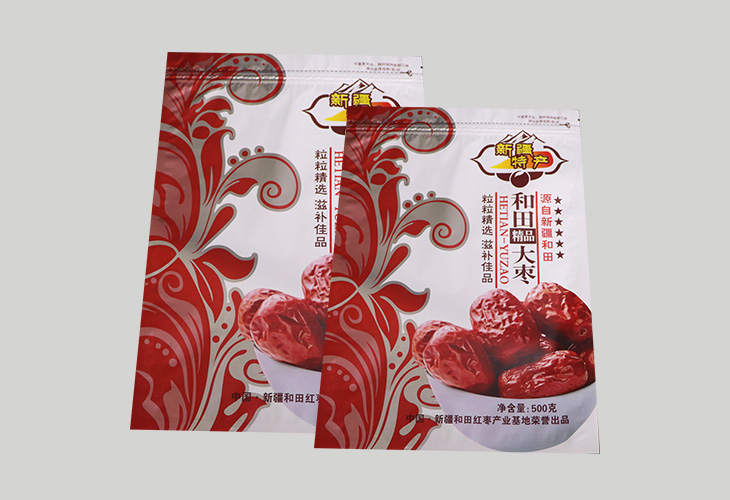复合包装袋的白点和气泡是怎么回事?
白点气泡:①干燥不充分
White spot bubbles: ① Insufficient drying
②上胶量不足:督办、复溶性差、转移率下降。。 薄膜太厚
② Insufficient glue application: poor supervision, poor solubility, and decreased transfer rate.. Thin film too thick
③复合后胶未流平:胶分子量大、熟化不够,复合热辊温度太低、气温较低而预热辊没用
③ After compounding, the glue is not leveled: the molecular weight of the glue is large, the aging is not enough, the temperature of the compounding hot roller is too low, and the temperature is too low, making the preheating roller useless
一、镀铝膜复合印刷基材,如产生气泡,在印刷膜浅色部分看起来是白点。气泡部分两层基材未密切贴合,不一定是圆鼓鼓地凸起状。但严重的干燥不良形成的气泡倒是鼓起的,大的像芝麻粒。产生这类气泡的原因有的是胶黏剂未干透,有的是油墨溶剂干燥不充分造成,经常出现在大面积跌印部分。某些小印刷机还在使用红外线干燥箱。轻微的干燥不良虽然没有鼓起大气泡,只足够小事,能透过某些薄膜释放溶剂。如同样的工艺条件,PET复铝箔有气泡,而BOPP复铝箔热化后气泡会消失。

1、 Aluminum coated composite printing substrate, if bubbles are generated, appears as white dots in the light colored part of the printing film. The two layers of substrate in the bubble part are not closely attached, and may not be bulging. But the bubbles formed by severe poor drying are bulging, large like sesame seeds. Some of the reasons for producing such bubbles are due to incomplete drying of the adhesive, while others are due to insufficient drying of the ink solvent, often appearing in large areas of drop printing. Some small printing machines still use infrared drying boxes. Mild dryness, although not accompanied by large bubbles, is only minor enough to release solvents through certain thin films. Under the same process conditions, PET composite aluminum foil has bubbles, while BOPP composite aluminum foil will disappear after heating.
二、干燥不良形成的小气泡和上胶量不足产生的气泡用放大镜观察区别不大,这时需要作理性分析。任何看起来很光滑的表面,用放大镜观察都是凹凸不平的。胶黏剂把表面抹平需要一定厚度——也就是上胶量。普通透明复合膜用低粘度胶黏剂。印刷膜涂胶要厚点,如白膜,色块下托白膜厚度就更大。里印复合墨树脂含量少于表印白膜,所以复合白墨表面比较粗糙。粗糙苯类是复合白墨的优点,有利于胶黏剂渗透产生足够的剥离强度,反过来却需要较多的上胶量。为了保证油墨部分有足够的胶黏剂厚度,上胶量需3-3.5G,少于这标准也是上胶量不足。因堵版造成上胶量不足容易理解。堵版分2种:一时突发性的,因涂料复溶性差和操作中转移率不断下降造成。这类堵版如未找出原因及时排除,仅靠停车擦版只能维持一时。另一种堵版是渐变型的,严格地说不能算故障,因为每次复合后不可能把网纹辊中的残胶完全清洗干净,残胶日复一日地在网孔底部沉积固化。上胶量慢慢变小、小气泡也渐渐产生、由少变多、由小变大。终因某做要求高的产品和复合较厚的膜,小气泡变得不可容忍。这时要用专门的洗版液。问题是解决了,却不是一种好的生产习惯,因为之前有大量介于合格与不合格之间的产品被生产出来。我们提倡定期测量上胶量,当上胶量递减预定值时就清洗。
2、 There is not much difference between the small bubbles formed by poor drying and the bubbles generated by insufficient glue application when observed with a magnifying glass. Therefore, rational analysis is necessary. Any surface that looks very smooth is uneven when viewed with a magnifying glass. The adhesive needs a certain thickness to smooth the surface - that is, the amount of adhesive applied. Low viscosity adhesive for ordinary transparent composite films. Printing film coating should be thicker, such as white film, and the thickness of the white film under the color block is even greater. The resin content of inner printed composite ink is less than that of surface printed white film, so the surface of composite white ink is relatively rough. Rough benzene is an advantage of composite white ink, which is beneficial for the penetration of adhesive to produce sufficient peel strength, but in turn requires a higher amount of adhesive application. In order to ensure sufficient adhesive thickness for the ink part, the adhesive amount needs to be 3-3.5G, which is also insufficient. It is easy to understand that insufficient glue application is caused by blocking the plate. There are two types of blocking: temporary and sudden, caused by poor paint re solubility and continuous decrease in transfer rate during operation. If the cause of this type of blockage is not identified and eliminated in a timely manner, relying solely on parking and wiping the plate can only maintain it for a while. Another type of blocking is a gradient type, strictly speaking, it cannot be considered a malfunction because it is impossible to completely clean the residual glue in the anilox roller after each composite, and the residual glue accumulates and solidifies at the bottom of the mesh hole day after day. The amount of glue gradually decreases, and small bubbles gradually emerge, increasing from less to more, and from small to large. Eventually, due to the production of demanding products and thick composite films one day, small bubbles became intolerable. At this point, a specialized plate washing solution needs to be used. The problem is solved, but it is not a good production habit because a large number of products were previously produced between qualified and unqualified. We advocate regularly measuring the amount of glue applied and cleaning when the amount of glue decreases to a predetermined value.
三、有时候干燥很充分,上胶量也不少,刚下机的复合膜还是有气泡。其实刚复合好的产品没有一点气泡是不太可能的。小的气泡经过熟化能,因为不含溶剂但没哟充分固化的聚氨酯胶黏剂有一定的流动性。温度越高流动越大,分子量越大流动性越小,固化的实质就是分子量不断增大的过程。熟化室中的复合膜,胶黏剂在温度的作用下缓慢流平,大气泡缩小,小气泡消失,直胶黏剂的分子量增大到胶不能流动为止。有经验的操作工看得出多大的白点能消失,如没有把握先把样品放进80度烘箱中30分钟,检查气泡是否去除。同样大小的气泡,低粘度的胶能,而高粘度胶可能不行,这是因为50%高粘度胶分子量大,流平性差。
3、 Sometimes the drying is sufficient, and the amount of glue applied is also considerable. The composite film just removed from the machine still has bubbles. In fact, it is impossible for a newly compounded product to have no bubbles at all. Small bubbles can be eliminated by aging, as polyurethane adhesives that do not contain solvents but do not fully cure have a certain degree of fluidity. The higher the temperature, the greater the flow, the larger the molecular weight, and the smaller the fluidity. The essence of solidification is the process of continuously increasing molecular weight. The composite film in the curing chamber is slowly flattened by the adhesive under the action of temperature, with large bubbles shrinking and small bubbles disappearing until the molecular weight of the adhesive increases to the point where the adhesive cannot flow. Experienced operators can see how large white spots can disappear. If unsure, it is best to first place the sample in an 80 degree oven for 30 minutes and check if bubbles are removed. Bubbles of the same size can be eliminated with low viscosity glue, while high viscosity glue may not be effective because 50% of high viscosity glue has a large molecular weight and poor leveling performance.
 18764138233
18764138233
 18764138233
18764138233

 18764138233
18764138233
